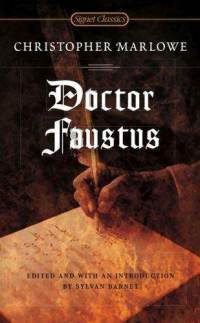Doctor Faustus By Christopher Marlowe Summary and Analysis Scene 6
 SCENE 6
SCENE 6FAUSTUS.
When I behold the heavens, then I repent,
And curse thee, wicked Mephistophilis,
Because thou hast depriv'd me of those joys.
MEPHISTOPHILIS.
Why, Faustus,
Thinkest thou heaven is such a glorious thing?
I tell thee, 'tis not half so fair as thou,
Or any man that breathes on earth.
FAUSTUS.
How prov'st thou that?
MEPHISTOPHILIS.
'Twas made for man, therefore is man more excellent.
FAUSTUS.
If it were made for man, 'twas made for me:
I will renounce this magic and repent.
Enter GOOD ANGEL and EVIL ANGEL.
GOOD ANGEL.
Faustus, repent; yet God will pity thee.
EVIL ANGEL.
Thou art a spirit; God cannot pity thee.
FAUSTUS.
Who buzzeth in mine ears I am a spirit?
Be I a devil, yet God may pity me;
Ay, God will pity me, if I repent.
EVIL ANGEL.
Ay, but Faustus never shall repent.
[Exeunt ANGELS.]
FAUSTUS.
My heart's so harden'd, I cannot repent:
Scarce can I name salvation, faith, or heaven,
But fearful echoes thunder in mine ears,
"Faustus, thou art damn'd!" then swords, and knives,
Poison, guns, halters, and envenom'd steel
Are laid before me to despatch myself;
And long ere this I should have slain myself,
Had not sweet pleasure conquer'd deep despair.
Have not I made blind Homer sing to me
Of Alexander's love and Oenon's death?
And hath not he, that built the walls of Thebes
With ravishing sound of his melodious harp,
Made music with my Mephistophilis?
Why should I die, then, or basely despair?
I am resolv'd; Faustus shall ne'er repent. —
Come, Mephistophilis, let us dispute again,
And argue of divine astrology.
Tell me, are there many heavens above the moon
Are all celestial bodies but one globe,
As is the substance of this centric earth?
MEPHISTOPHILIS.
As are the elements, such are the spheres,
Mutually folded in each other's orb,
And, Faustus,
All jointly move upon one axletree,
Whose terminine is term'd the world's wide pole;
Nor are the names of Saturn, Mars, or Jupiter
Feign'd, but are erring stars.
FAUSTUS.
But, tell me, have they all one motion, both situ et
tempore?
MEPHISTOPHILIS.
All jointly move from east to west in twenty-four hours
upon the poles of the world; but differ in their motion upon
the poles of the zodiac.
FAUSTUS.
Tush,
These slender trifles Wagner can decide:
Hath Mephistophilis no greater skill?
Who knows not the double motion of the planets?
The first is finish'd in a natural day;
The second thus; as Saturn in thirty years; Jupiter in twelve;
Mars in four; the Sun, Venus, and Mercury in a year; the Moon in
twenty-eight days. Tush, these are freshmen's suppositions.
But, tell me, hath every sphere a dominion or intelligentia?
MEPHISTOPHILIS.
Ay.
FAUSTUS.
How many heavens or spheres are there?
MEPHISTOPHILIS.
Nine; the seven planets, the firmament, and the empyreal
heaven.
FAUSTUS.
Well, resolve me in this question; why have we not
conjunctions, oppositions, aspects, eclipses, all at one time,
but in some years we have more, in some less?
MEPHISTOPHILIS.
Per inoequalem motum respectu totius.
FAUSTUS.
Well, I am answered. Tell me who made the world?
MEPHISTOPHILIS.
I will not.
FAUSTUS.
Sweet Mephistophilis, tell me.
MEPHISTOPHILIS.
Move me not, for I will not tell thee.
FAUSTUS.
Villain, have I not bound thee to tell me any thing?
MEPHISTOPHILIS.
Ay, that is not against our kingdom; but this is. Think
thou on hell, Faustus, for thou art damned.
FAUSTUS.
Think, Faustus, upon God that made the world.
MEPHISTOPHILIS.
Remember this.
[Exit.]











